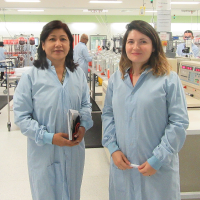A developing country with no national health system, difficult terrain and transport, limited government support, technology restrictions, and the fallout from a devastating earthquake are all challenges the director of the Nepalese Blood Transfusion Services (NBTS), Dr Manita Rajkarnikar, is ready to tackle anew upon her return home after a 12-week intensive study visit with the Australian Red Cross Lifeblood.
During Dr Rajkarnikar’s visit, supported by the Global Advisory Panel (GAP) on Corporate Governance and Risk Management of Blood Service in Red Cross and Red Crescent Societies, she visited donor centres, processing centres and offices around the country to learn hands-on about our processes.
Dr Rajkarnikar has worked at the NBTS for 18 years and as director for four. As she says, “It’s not an easy job!”.
The NBTS celebrates 50 years of operation this year. Annually, it collects over 200,000 donations and supplies over 300,000 products to Nepal’s population of 28 million with minimal resources, including just one centre equipped for apheresis!
“Nepal is a small country, we have so many difficulties and things to be done,” explained Dr Rajkarnikar. “This is because we don’t have a national standard in place, we don’t have a system in place, and we don’t have national coordination with all blood transfusion services.”
Along with hosting Dr Rajkarnikar, GAP is currently assisting the NBTS with technical support setting up their new head office and processing building. This will replace the old office, which was one of 10 collection centres damaged beyond repair and 12 partially damaged in Nepal’s April 2015 earthquake.
The saddest loss, though, was the death of one BTS staff member, two volunteers and eight donors when a temple collapsed on a blood donation camp. It was a sad time for the organisation and personally for Dr Rajkarnikar.
Despite challenges like these, she, like her country and the NBTS, is resilient, positive and determined. “Even with that, we were working with team spirit after the earthquake,” she said.
For Dr Rajkarnikar, this trip was an opportunity to gain first-hand knowledge she can use to guide change for the better in Nepal.
“Seeing things is different from hearing or getting a briefing,” she said. “So, I have come here and I have seen these things and I have learned. It’s easier for me to take them back home.”
Photo: Nepal Blood Transfusion Service Director Dr Manita Rajkarnikar during her 12-week study visit at the Australian Red Cross Lifeblood.

